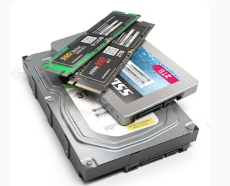Solid-state drives (SSDs) and hard disk drives (HDDs) are two types of storage devices commonly used in computers and laptops. While both serve the primary function of storing data, there are key differences between SSDs and HDDs in terms of technology, speed, durability, and performance. Here are some notable differences between SSDs and HDDs:
Technology:
- HDDs: Hard disk drives use magnetic spinning disks (platters) to store data. Data is written and read through a moving read/write head that accesses the spinning disk. HDDs have been the traditional form of storage for decades.
- SSDs: Solid-state drives use flash memory (NAND chips) to store data. SSDs have no moving parts, and data is stored electronically. This technology makes SSDs faster, more durable, and less susceptible to physical damage.
Speed and Performance:
- HDDs: HDDs are slower in terms of data access and data transfer speeds compared to SSDs. The speed of an HDD is limited by the spinning disk and moving read/write head, resulting in longer boot times and slower file operations.
- SSDs: SSDs are significantly faster than HDDs due to their lack of moving parts. SSDs offer faster data access, quicker boot times, and speedier file transfers, resulting in a noticeable performance improvement, especially in tasks that require frequent read/write operations.
Durability and Reliability:
- HDDs: HDDs are more prone to physical damage and failure because of their moving parts. The spinning disks and read/write heads can wear out over time, making HDDs more vulnerable to mechanical failures and data loss.
- SSDs: SSDs are more durable and reliable due to their solid-state design. With no moving components, SSDs are less susceptible to physical shock, vibration, or mechanical failure. This makes SSDs a more robust option for portable devices.
Capacity and Cost:
- HDDs: HDDs typically offer larger storage capacities at a lower cost per gigabyte compared to SSDs. If you require high capacity storage for a lower price, HDDs are a cost-effective option for storing large amounts of data.
- SSDs: While SSDs are more expensive per gigabyte compared to HDDs, the prices have been decreasing over the years as SSD technology advances. SSDs are available in various capacities and offer faster performance, making them a preferred choice for users seeking speed and responsiveness.
Power Consumption:
- HDDs: HDDs consume more power due to the spinning disks and moving parts. This can impact battery life in laptops and increase power consumption in desktop computers.
- SSDs: SSDs consume less power because they don’t have moving parts. This makes SSDs more energy-efficient, resulting in improved battery life for laptops and reduced power usage for desktop systems.
The choice between an SSD and an HDD depends on your specific needs, priorities, and budget. While HDDs offer cost-effective storage with higher capacities, SSDs provide faster performance, durability, and energy efficiency. Many users opt for a combination of both types of storage, using an SSD for the operating system and critical applications, while using an HDD for mass storage of files and data.
